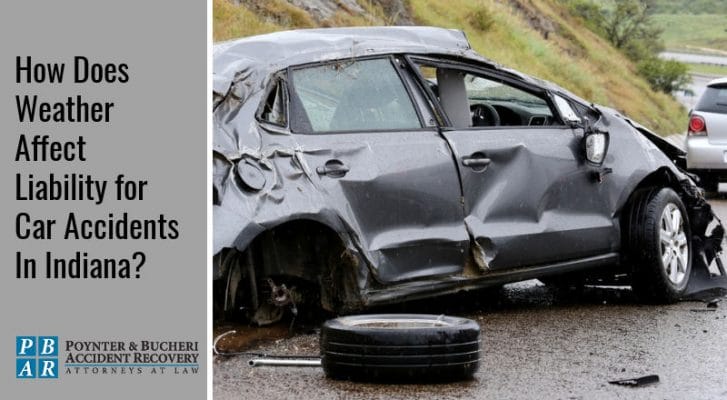
How Does Weather Affect Liability for Car Accidents In Indiana?

What you’ll learn from reading this article:
- How weather affects liability for car accidents in Indiana
- Pointers for driving safely in hazardous weather conditions
Indiana is blessed (is that the right word?) with all kinds of weather — much of it dangerous for drivers. Yes, our spring and summer seasons are beautiful but often plagued with thunderstorms.
In 2019, the National Weather Service reported more than 550 severe thunderstorms in Indiana, including more than 400 that caused wind damage. At other times of the year, we get fog and sudden snowstorms. Indianapolis gets an average of 29.9 inches of snow per year, the 15th most out of any major U.S. city. Since it’s unlikely that Jack Frost carries collision insurance, you may be wondering how weather affects liability for car accidents in Indiana.
Weather, Car Accidents, and Liability
Indiana’s modified comparative fault negligence system means that one or more individuals can share in the liability for an accident. Each party’s contribution to the accident factors into the amount of damages he or she can recover. However, if an individual’s percentage of fault reaches or exceeds 51%, he or she is barred from recovery.
All drivers are responsible for maintaining control of their vehicles. What many people don’t realize is that simply obeying the law may not be a sufficient defense when involved in an accident.
For example, the speed limit may be 45 as you cross that icy bridge or steer your way through that steep turn in a violent downpour. You are responsible for slowing down and taking the road conditions into account. All drivers are obliged to take steps to compensate for weather conditions.
Negligence and Claiming Damages
If you are in a weather-related accident and the other driver has neglected to do any of the following things, and if you yourself are under 51% liable, you may be able to claim damages:
- Drive under the speed limit on wet or icy roads.
- Take turns slowly to account for conditions.
- Pull to the side safely when it is impossible to see.
- Use hazard lights when the vehicle is disabled or if the weather has made it necessary to pull to the side.
- Maintain tires. Worn tires have less ability to resist hydroplaning.
- Keep windshield wipers in working order and use them when it is raining.
- Turn on headlights when unable to see at least 500 feet ahead.
Because weather-related accidents have so many variables, you are advised to consult with an experienced accident attorney who has dealt with similar cases. The attorneys at Poynter & Bucheri work quickly to obtain evidence that proves the other driver or another party was at fault for the crash. Our goal is to quash any claim the insurance company may try to make that prevents you from recovering full compensation for all damages.
As we mentioned above, Indiana’s location (west of the Ohio River valley, east of the Rockies, and south of the Great Lakes Region) makes it prone to a variety of weather patterns, some of them dangerous. In addition, (plowed down in winter) cornfields in much of the state provide huge swathes of windswept land that create conditions for icy roads. Always drive safely to protect yourself and others.
Tips for Driving in Adverse Conditions:
- Wear your seatbelt (and make sure that everyone in your car is also buckled up).
- Adjust your speed limit (slow down!).
- Leave an adequate stopping distance. It will take longer than in good conditions.
- Check your tire treads regularly.
- Make sure all brake lights, headlights, and tail lights are in good condition.
- Make sure windshield wipers are functional.
- Avoid drowsy or distracted driving. You need all of your concentration.
- Keep headlights and windows clean so that you have good visibility.
- Pull to the side of the road if you can’t see to drive safely.
- Drive with winter supplies, such as an ice scraper, a snow brush, a small shovel.
- Make sure you have gloves, a blanket, and water with you in the car.
If you have been involved in a weather-related accident, you have options. Contact a car accident attorney who is well versed in Indiana law and knows how to navigate the aftermath of accidents caused by weather conditions. Call 1-800-265-9881 for a free case review. Or contact us online.
